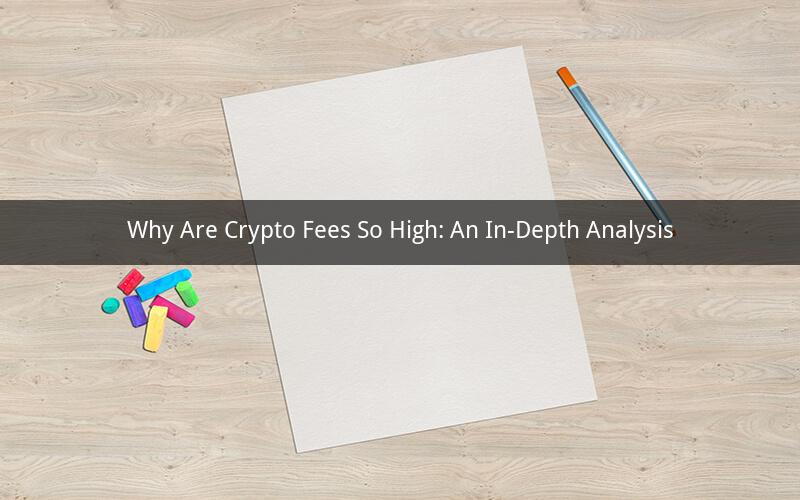
Introduction:
Cryptocurrency has revolutionized the financial world, offering decentralized and borderless transactions. However, one aspect that often confuses users is the high fees associated with these transactions. In this article, we will delve into the reasons behind the high crypto fees and explore the factors that contribute to this phenomenon.
1. Network Congestion:
One of the primary reasons for high crypto fees is network congestion. As the popularity of cryptocurrencies continues to soar, the number of transactions on the network increases exponentially. This congestion leads to a higher demand for block space, which, in turn, drives up the fees.
When the network is crowded, miners prioritize transactions with higher fees. This is because miners have to select which transactions to include in the next block, and they prefer those that offer higher rewards. As a result, users who are willing to pay more are more likely to have their transactions confirmed quickly.
2. Block Size Limitations:
Another factor contributing to high crypto fees is the block size limitations of certain cryptocurrencies. For instance, Bitcoin has a maximum block size of 1 MB, which restricts the number of transactions that can be processed in a given block.
When the block size limit is reached, the network becomes saturated, and transactions pile up. Miners can only include a limited number of transactions in each block, and the remaining transactions have to wait for the next block. This creates a backlog, leading to increased fees as users compete to get their transactions confirmed.
3. Transaction Confirmation Time:
The time it takes to confirm a transaction also plays a role in determining the fees. In cryptocurrencies like Bitcoin, the average confirmation time is around 10 minutes. However, during times of high network congestion, this time can extend to several hours or even days.
Users who require faster confirmation times are willing to pay higher fees to ensure their transactions are processed quickly. This incentivizes miners to prioritize these transactions, further driving up the fees.
4. Economic Incentives for Miners:
Miners are the backbone of the cryptocurrency network, as they validate and secure transactions. In return for their efforts, they receive rewards in the form of newly minted coins and transaction fees.
The high fees serve as an economic incentive for miners to continue participating in the network. It compensates them for the computational power and electricity consumed in mining. Without this incentive, miners may become less motivated to secure the network, leading to potential vulnerabilities.
5. Lack of Scalability Solutions:
The lack of scalability solutions in certain cryptocurrencies also contributes to high fees. Scalability refers to the ability of a network to handle a growing number of transactions without compromising on security or performance.
Cryptocurrencies that have not implemented scalable solutions often face network congestion and high fees. This is because their current infrastructure cannot handle the increasing demand for transactions. As a result, users have to pay higher fees to ensure their transactions are processed promptly.
Questions and Answers:
1. Q: Can high crypto fees be avoided?
A: Yes, high crypto fees can be avoided by choosing a cryptocurrency with better scalability solutions, such as Ethereum 2.0 or Bitcoin's Lightning Network. These solutions aim to reduce congestion and lower fees by offloading transactions to secondary layers or using more efficient consensus mechanisms.
2. Q: Are high crypto fees a permanent issue?
A: High crypto fees are not a permanent issue. As the technology evolves and scalability solutions are implemented, fees are expected to decrease. However, it is important to note that network congestion and high fees are inherent challenges in the early stages of a growing cryptocurrency network.
3. Q: Why are miners prioritizing transactions with higher fees?
A: Miners prioritize transactions with higher fees to maximize their rewards. By selecting transactions with higher fees, they can ensure faster confirmation times and increase their chances of receiving a larger reward for their computational efforts.
4. Q: Can users reduce their crypto fees by choosing a different cryptocurrency?
A: Yes, users can reduce their crypto fees by choosing a cryptocurrency with lower transaction fees or better scalability solutions. It is essential to research and compare different cryptocurrencies to find the most cost-effective option for their specific needs.
5. Q: Are high crypto fees a sign of a healthy cryptocurrency network?
A: High crypto fees can be a sign of a healthy cryptocurrency network, as they indicate high demand and active participation. However, excessively high fees can discourage users from transacting and hinder the adoption of cryptocurrencies. Finding a balance between network congestion and fees is crucial for the long-term success of a cryptocurrency.